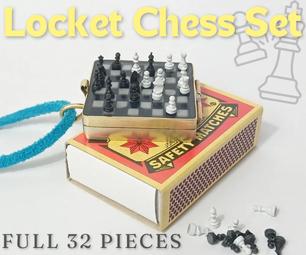Introduction: FABfiber Mini Loom
Traditionally, looms are used to weave together fibers in order to create pieces such as tapestries, blankets, scarves, towels, and more. Our FABfiber Mini Looms allow you to do those same projects, but on a smaller scale. If you’ve ever thought about wanting to learn to weave, but buying a full sized loom is too expensive then this is the perfect tool for you!
These looms have been through two 6-person workshops where they were tested and built using the instruction manuals from a variety of skill levels. We are confident that ANYONE can build these looms! In addition, similarly styled looms are approximately $250 where the material cost of a FABfiber Mini Loom is approximately $6.
*** If you are going to make your own designs in Illustrator, keep in mind that it is more suitable to etch black-and-white line drawings than it is to etch anything shaded or colored. Vectors are best!
Note: the FABfiber Mini Loom heddle is 8 dent and contains 87 slots for fiber strands.
Check out our project website at dcfabfiber.wordpress.com where you can view more information about our project, bios from the team, weekly updates, and our full line of tools!
Step 1: Materials
Hardware Store
1 x Mini Loom laser cut file set from ¼” MDF board
1 x Heddle & Shuttle laser cut file set from ⅛” MDF board
3 x 12-inch long dowels, ½” diameter
2 x 14-inch long dowels, ½” diameter
2 x 11-inch long dowels, ANY size smaller than ½” diameter
6 x ¾” wood screws
2 x 10 - 24 ¾” machine screws
2 x 10 - 24 ¾” nuts (to fit the machine screws)
In Home Materials
1 x Thick straw (i.e. milkshake / boba straw)
Cotton (or non-stretchy) string
White craft glue or wood glue
Small power drill or Philips screw driver
Step 2: Where Can I Laser Cut My Mini Loom and Single Heddle Cuts?
The Mini Loom Cut file will need to be laser cut using 1/4th MDF or plywood while the Single Heddle Cut file will need to be cut using 1/8th inch MDF or plywood. TechShop is a business dedicated to bringing wood shop and fabrication tools to users across the United States for a membership fee. If you are located near the cities listed below, you have access to one of the TechShop locations! If fabrication is something that you are interested in consistently, this could be a great investment.
Chandler, AZ
Redwood City, CA
San Francisco, CA
San Jose, CA
Allen Park, MI
St. Louis, MO
Pittsburgh, PA
Round Rock, TX
Arlington, VA
If you are not located near these cities or are only utilizing a laser cutter once, the next best option is to submit the designs online and have the final cut pieces shipped to your home. A few of these types of websites that are inexpensive, easy to follow, and located in the U.S. are:
We would also recommend searching the Internet for local options that are unique to your city, state or country!
Step 3: Screw Dowels
Take the three 12-inch long dowels and the six ¾” screws and screw dowels in place.
Step 4: Insert Dowels
Take Mini Loom Piece A and B and insert the two 14-inch long dowels through the ½ inch holes.
Step 5: Glue Washers
On the top right, outer side of the Mini Loom body piece, insert one of the washers onto 14-inch dowel. Glue to dowel-- NOT the loom body piece! It must be able to turn. Repeat on bottom left, outer side of the other Mini Loom body piece with other washer.
Step 6: Set Pawls
Attach pawl to bottom right, outer side of Mini Loom body piece using one ¾” machine screw and one nut. Repeat on top left, outer side of the other Mini Loom body piece with the other pawl. Leave pawls slightly loose to be able to spin and catch on the ratchets.
Step 7: Glue Ratchets
Glue ratchet to 14-inch dowel (again, only to the dowel!) on bottom right, outer side of one Mini Loom body piece. Repeat on on top left, outer side of other Mini Loom body piece.
Step 8: Tie on Rods
To make tie on rods, take three equal strands of string and use slipknots to connect each string to the bottom 14-inch dowel at one end of the Mini Loom. Tie knots to connect the other end of the string to one 11-inch dowel. Make sure that all three strings are level! Repeat this on the opposite side of the Mini Loom with another 11-inch dowel.
Step 9:
To assemble your heddle, take two of the pieces of MDF that were laser cut below the heddle and glue to either side of the matching bottom piece. Repeat on the top portion of the heddle. Wrap with tape to hold sections together until the glue is dry.
Step 10: Spinning Shuttle
Take the boba or milkshake straw and slide it onto the middle piece of the shuttle. Use scissors to cut the straw to a length that will not allow the straw to easily fall out of the shuttle. To thread, take wefting yarn and wrap around straw center. Pull through side hole to use while weaving.
Step 11: How to Warp Your Loom
This YouTube video gives a great, speedy demonstration on how to warp your rigid heddle loom to begin weaving.









